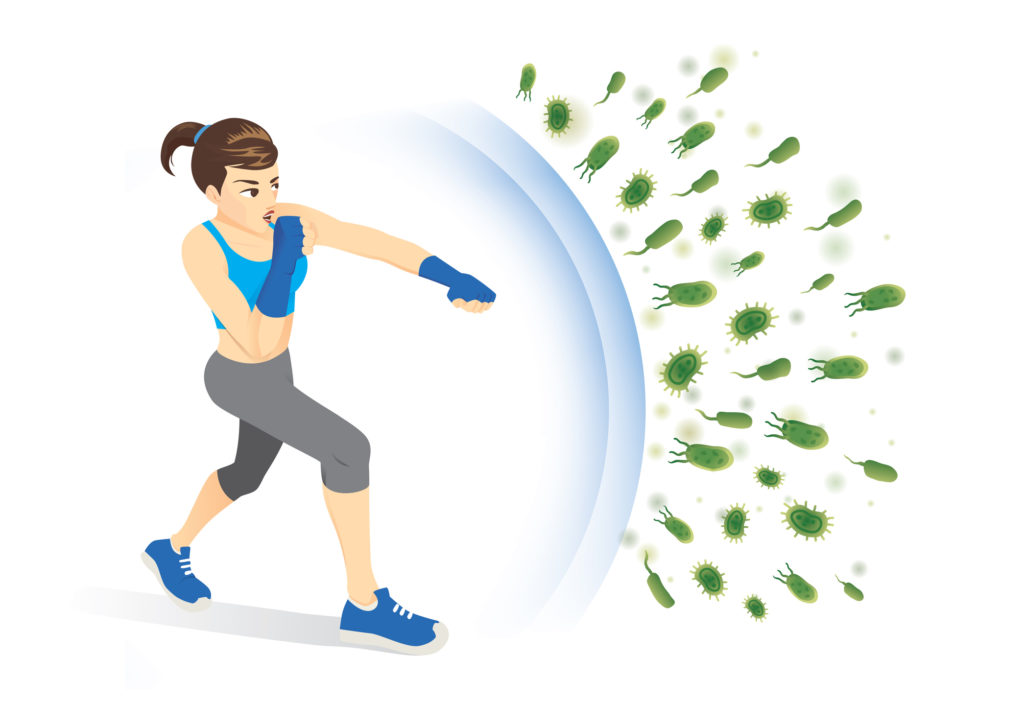One of the best ways to keep your children healthy is to teach them healthy habits from an early age, including exercise, eating right, and getting plenty of sleep. All of these can boost children’s immunity and make them less susceptible to catching colds or other viruses that are so prevalent in the fall and winter months, when school-age children spend most of their time indoors at school or home with family and friends. Here are the top five healthy habits that you can start teaching your children now to boost their immunity for the rest of their lives!
1) Clean your hands
 Clean hands are especially important for kids as they’re more likely to put their fingers in their mouths and touch surfaces that are covered in germs. Make it a habit to ask your children each day if they’ve washed their hands, and set an example by washing your own regularly too. If you see them or someone else touch something dirty, remind them that they need to wash their hands again. This not only helps build good habits but also strengthens moral values.
Clean hands are especially important for kids as they’re more likely to put their fingers in their mouths and touch surfaces that are covered in germs. Make it a habit to ask your children each day if they’ve washed their hands, and set an example by washing your own regularly too. If you see them or someone else touch something dirty, remind them that they need to wash their hands again. This not only helps build good habits but also strengthens moral values.
Runny noses and coughs are often signs of an illness. If your child has a cold, they may have difficulty breathing through their nose, which means they can get dehydrated easily. Help them keep up their fluids by encouraging them to drink more water or juice during cold seasons. However, avoid giving them sugary drinks as it’ll make dehydration worse. For children suffering from fevers and other symptoms of a common cold, such as sore throats and body aches, over-the-counter pain relievers can help ease discomfort while reducing fevers so they get better faster.
2) Eat breakfast daily
 Multiple studies indicate that having breakfast helps, even if it’s just a quick bowl of cereal. You’ll be energized until at least lunchtime. Though there are lots of advantages to eating breakfast, one benefit may be the breakfast itself will stimulate children’s immune systems and provide them with enough energy to pursue a healthier lifestyle all day. On top of that, some research has shown that eating breakfast might have the side effect of improving children’s memory and attention spans. To avoid that, they should make their breakfast the important meal of the day. skip giving your child sugary cereals or muffins for breakfast. Find a healthier alternative like Greek yogurt with berries, whole wheat toast with jam, or a hardboiled egg or two.
Multiple studies indicate that having breakfast helps, even if it’s just a quick bowl of cereal. You’ll be energized until at least lunchtime. Though there are lots of advantages to eating breakfast, one benefit may be the breakfast itself will stimulate children’s immune systems and provide them with enough energy to pursue a healthier lifestyle all day. On top of that, some research has shown that eating breakfast might have the side effect of improving children’s memory and attention spans. To avoid that, they should make their breakfast the important meal of the day. skip giving your child sugary cereals or muffins for breakfast. Find a healthier alternative like Greek yogurt with berries, whole wheat toast with jam, or a hardboiled egg or two.
3) Spend time outdoors
 There’s no time better spent than time outdoors! Children will have fun, enjoy a new environment, and form healthy habits that will last a lifetime. An even better thing about taking children outdoors, studies show that spending time in nature can help boost immunity and give an increase in stamina – great for any kid who gets sick at every turn. Children might be ready for a change of pace after three months of staying inside during the winter. Why not take them outside on a nice day and let them run around? They’ll love it! And you’ll be giving them a healthy habit they’ll never forget.
There’s no time better spent than time outdoors! Children will have fun, enjoy a new environment, and form healthy habits that will last a lifetime. An even better thing about taking children outdoors, studies show that spending time in nature can help boost immunity and give an increase in stamina – great for any kid who gets sick at every turn. Children might be ready for a change of pace after three months of staying inside during the winter. Why not take them outside on a nice day and let them run around? They’ll love it! And you’ll be giving them a healthy habit they’ll never forget.
4 Tips For Playing Outside With Kids:
1) Wear appropriate clothing: It may sound obvious, but always make sure your child is dressed appropriately before heading out into potentially extreme weather conditions. Even if it’s warm out, you should still make sure they are wearing sunscreen or some other kind of sun protection factor so they don’t get burned while playing outdoors.
2) Bring plenty of water and snacks: When you’re outside for a long period of time, especially in warmer temperatures, children will need plenty of water and food to keep their energy up. You can also bring along small toys that can be used to play games like tag or hide-and-seek.
3) Pack a first aid kit: Accidents happen when you least expect them, which is why it’s important to have a first aid kit on hand at all times when you’re spending time with kids. If someone gets hurt, you’ll be able to take care of any injuries right away instead of having to wait until you get home.
4) Go with a friend: Whenever possible, try to go outside with another adult who has children around the same age as yours. This way, both sets of parents can spend time together and each set can watch over one another’s kids during outdoor activities.
4) Drink plenty of water

When you drink enough water you will maintain your energy levels and stay alert. Drinking enough water will help you concentrate and achieve better grades in school. Likewise, we can also get sick if we don’t have enough water to drink. Dehydration makes our immune system weaker, and then it becomes difficult to fight against an infection such as a cold virus, bacteria, or other sources of sickness circulating through the people at school or daycare. Quench your thirst! Drink at least eight 8-ounce glasses of water each day. But actually, including water in all your meals and snacks will not be as hard as you might think. It may even help you feel fuller for longer periods of time. When it’s hot out, it’s especially important to drink plenty of water to avoid dehydration.
5) Exercise regularly

While a lack of exercise doesn’t cause poor health, regular physical activity boosts immunity by increasing stamina. One study found that active children were almost half as likely to be ill as their inactive peers. On top of that, exercise can boost immunity in adults by reducing stress and helping control weight, both of which affect immune function. People who are fit also have stronger immune systems and take longer to get sick if they come into contact with a virus or other illness-causing agent. What’s more, exercise has been shown to help kids maintain healthy body weights, boosting their immunity and lowering their risk for certain diseases later in life.
You will have a much easier time changing your child’s behavior in the future if you start making changes now. For example, if they sit inside watching TV all day, schedule them to do something active, like playing outside or riding bikes, every day. Encourage them by letting them know how wonderful it feels to be healthy. But be sure not to pester them too much about it; start off slowly and at an easy pace so you don’t overstress your child. Daily activity is important to building up your child’s immune system.













